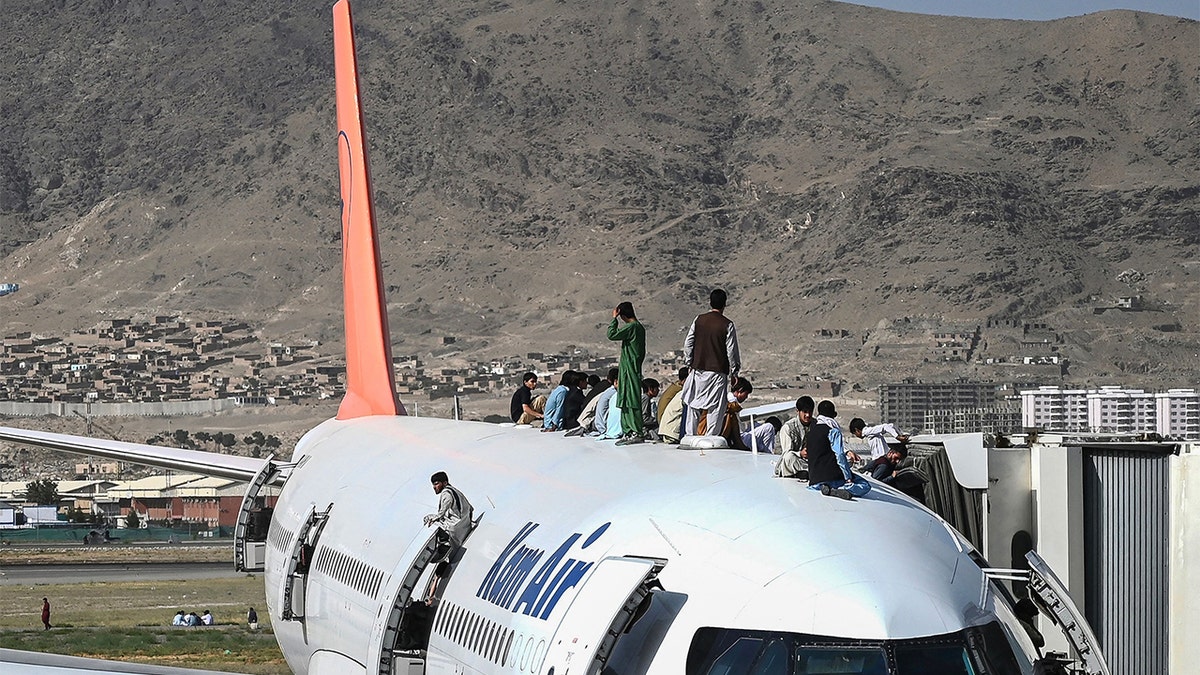Congressman reports after touring Afghan evacuees housing
Congressman Tom Tiffany, R-WI, discusses Afghan refugee housing on 'Tucker Carlson'
The Department of Homeland Security this week announced that it is moving to allow Afghan civil servants who worked during the Taliban regime to be exempted from terror-related restrictions and be allowed entry into the U.S.
The U.S. has been bringing tens of thousands of Afghans to the U.S. since the Taliban takeover and U.S. withdrawal from Afghanistan last year. As that is ongoing, the Biden administration is moving to exempt certain Afghans who may be caught up in terrorism-related inadmissibility grounds (TRIG).
TRIG places limits on individuals who are members of a terrorist organization or who have engaged in terrorism, making them inadmissible to the U.S. and ineligible for immigration benefits. The USCIS website says that the definition of terrorism-related activity "is relatively broad and may apply to individuals and activities not commonly thought to be associated with terrorism."
Fox News Digital first reported in both October and April that the Biden administration was considering exemptions for Taliban-era civil servants, as well as others who have fought alongside the U.S. in resistance movements against the Taliban and the Soviet Union.
In a statement issued this week, DHS confirmed that the TRIG exemptions would be available for three exemptions to be applied on a "case-by-case" basis.
The first would be for those employed as civil servants in Afghanistan at any time from Sept. 27, 1996 to Dec. 22, 2001 — after the U.S. invasion of Afghanistan in the wake of the 9/11 attacks — and after August 15, 2021. DHS said that could apply to many occupations including teachers, doctors and engineers — and those who used their position to mitigate Taliban repression.
The agency stressed that it does not include those who held high-level positions in government, or who directly assisted in violent activities by the repressive Islamist regime.

Aug 16, 2021: Afghan people climb atop a plane as they wait at the Kabul airport in Kabul. (WAKIL KOHSAR/AFP via Getty Images)
Also potentially exempt are Afghans who "supported U.S. military interests" by fighting in resistance movements against the Taliban, as well as Afghans who took part in the conflict against the Soviet occupation of Afghanistan. It does not apply to those who targeted civilians or U.S. interests, or who committed terror acts or human rights abuses.
Finally, it exempts "individuals who provided insignificant or certain limited material support to a designated terrorist organization." DHS gives the examples of paying tolls to pass through checkpoints or paying for utilities or to obtain a passport -- given the ubiquitous presence of the Taliban in Afghan life.
DHS said that previous exemptions have been given by multiple administrations, including in 2007, 2014, and 2019 — where the Trump administration exemption applicants who had worked with militias in the Lebanese Civil War.
"Doctors, teachers, engineers, and other Afghans, including those who bravely and loyally supported U.S. forces on the ground in Afghanistan at great risk to their safety, should not be denied humanitarian protection and other immigration benefits due to their inescapable proximity to war or their work as civil servants," said Secretary of Homeland Security Alejandro Mayorkas. "These exemptions will allow eligible individuals who pose no national security or public safety risk to receive asylum, refugee status, or other legal immigration status, demonstrating the United States’ continued commitment to our Afghan allies and their family members."
The administration stressed that all Afghans undergo multi-layered and "rigorous" vetting across multiple databases — and that only those who clear checks can be eligible for an exemption. But Republicans have been raising concern for months about the extent and reliability of such vetting.
A memo viewed by Fox in April appeared to acknowledge concerns about potential abuse by those who have deeper terror ties, warning that DHS "must ensure appropriate mechanisms are in place to ensure individuals do not obfuscate their affiliation with a Tier 1 or Tier 2 foreign terrorist organization by attempting to shape a narrative that would qualify for an exemption."
CLICK HERE TO GET THE FOX NEWS APP
A Pentagon inspector general report issued in February found that officials identified at least 50 Afghan evacuees who were brought to the United States in the wake of the U.S. withdrawal from Afghanistan whose information indicated "potentially significant security concerns" --and were unable to locate dozens of those who it said had "derogatory information" that would make them ineligible for parole.
So far more than 76,000 Afghans have been brought to the U.S. in the wake of the withdrawal from Afghanistan in August, which saw significant criticism for the chaotic way in which the U.S. pulled out in the face of the advancing Taliban.





